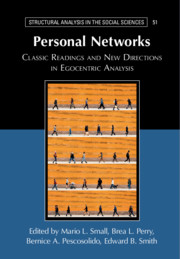Crossref Citations
This Book has been
cited by the following publications. This list is generated based on data provided by Crossref.
Bidart, Claire
2021.
Personal Networks.
p.
118.
2021.
Personal Networks.
p.
213.
Small, Mario L.
A. Pescosolido, Bernice
Perry, Brea L.
and
Smith, Edward B.
2021.
Personal Networks.
p.
3.
Wellman, Barry
Hampton, Keith N.
Quan-Haase, Anabel
and
Harper, Molly-Gloria
2021.
Personal Networks.
p.
282.
2021.
Personal Networks.
p.
296.
Smith, Sandra S.
and
Sanders, Jasmine M.
2021.
Personal Networks.
p.
596.
Perry, Brea L.
and
Roth, Adam R.
2021.
Personal Networks.
p.
431.
2021.
Personal Networks.
p.
417.
2021.
Personal Networks.
p.
185.
Sun, Hui
Brashears, Matthew E.
and
Smith, Edward B.
2021.
Personal Networks.
p.
555.
Borgatti, Stephen P.
and
Halgin, Daniel S.
2021.
Personal Networks.
p.
98.
2021.
Personal Networks.
p.
60.
2021.
Personal Networks.
p.
163.
Small, Mario L.
Perry, Brea L.
Pescosolido, Bernice
and
Smith, Edward B.
2021.
Personal Networks.
Volker, Beate
2021.
Personal Networks.
p.
308.
Fischer, Claude S.
2021.
Personal Networks.
p.
227.
Martin, John Levi
and
Kwon, Hyunku
2021.
Personal Networks.
p.
151.
Fernandez, Roberto M.
2021.
Personal Networks.
p.
251.
Centola, Damon
2021.
Personal Networks.
p.
73.
2021.
Personal Networks.
p.
265.





